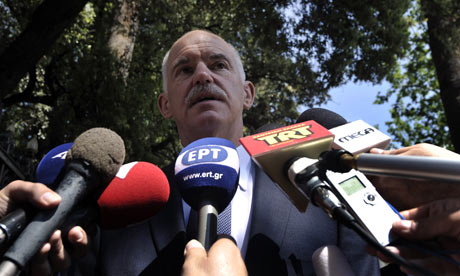Results 1 to 2 of 2
Thread Information
Users Browsing this Thread
There are currently 1 users browsing this thread. (0 members and 1 guests)
Threaded View
-
05-15-2011, 09:26 PM #1Senior Member


- Join Date
- May 2007
- Location
- South West Florida (Behind friendly lines but still in Occupied Territory)
- Posts
- 117,696
Greece Islands Will Not Be Loan Collateral Warns PM
Greece's islands will not be offered as loan collateral, warns prime minister
As EU finance ministers prepare for a meeting on the Greek crisis, George Papandreou insists: 'To ask us for an island or a monument as a guarantee is nearly an insult'
Heather Stewart and Andrew Clark
The Observer, Sunday 15 May 2011
43 Comments

Greece's prime minister, George Papandreou: 'The people expect our word and our actions are a sufficient guarantee.' Photograph: Aris Messinis/AFP/Getty Images
Greece's prime minister has hit out at fellow European nations for demanding "islands or monuments" as security for bailout loans ahead of a gathering of European finance ministers in Brussels on Monday to discuss the country's ailing finances.
Despite the conviction in financial markets that Greece's debts are unsustainable and will ultimately have to be restructured, eurozone ministers appear determined to top up last year's €110bn (£96bn) rescue package while forcing the beleaguered country into an ever tighter fiscal squeeze.
Prime minister George Papandreou gave a hint on Saturday of his frustration over the terms being discussed by creditor nations, which include Germany and France, by suggesting that they might demand a mortgage over Greece's historic antiquities – or even a lien over some of the country's Aegean islands.
"I want to add one thing on which we are very sensitive: to ask us for an island or a monument as a guarantee is nearly an insult," Papandreou told Italy's Corriere della Sera newspaper. "The people expect our word and our actions are a sufficient guarantee."
Athens has announced a list of state assets, from airports to motorways, that will be sold off to raise €50bn over four years, but there are concerns that the process has stalled. The country will come under pressure to step up austerity measures in exchange for a fresh bailout at Monday's meeting.
Michael Derks, chief strategist at broker FxPro, said eurozone countries are reluctant to loosen the terms of loans: "They don't want a restructuring, so they're going for the Band-Aid approach. Europe will probably say, 'Here's some extra money, but get on with the asset sales faster, then pay us back.'"
Officials from the European Commission and the International Monetary Fund are expected to complete their latest assessment of the austerity programme on Wednesday. But Ollie Rehn, the EU's monetary affairs commissioner, pre-empted its findings on Friday, warning "additional measures" would be needed after the latest forecasts showed Athens's debts would hit 166% of GDP next year, much worse than previously thought.
A new rescue package – involving tough new conditions – could be announced within a fortnight. Dominique Strauss-Kahn, the IMF's managing director, will travel to Berlin today to discuss the options with German chancellor Angela Merkel. George Osborne has won an assurance from his EU counterparts that Britain would not be forced to contribute to any new bailout.
A growing number of analysts now believe the ultimate outcome of the ongoing debt crisis will be that one or more countries – Greece being the first – will eventually leave the single currency.
"The longer this goes on, the more you increase the likelihood of serious damage to the relationship between the member states, and the more you risk the erosion of what remains a fairly sturdy consensus in favour of membership," said Simon Tilford, chief economist at the Centre for European Reform.
http://www.guardian.co.uk/business/2011 ... e-ministerJoin our efforts to Secure America's Borders and End Illegal Immigration by Joining ALIPAC's E-Mail Alerts network (CLICK HERE)


 LinkBack URL
LinkBack URL About LinkBacks
About LinkBacks






 Reply With Quote
Reply With Quote

PALESTINIANS COMING TO YOUR TOWN!
05-18-2024, 09:11 PM in Videos about Illegal Immigration, refugee programs, globalism, & socialism